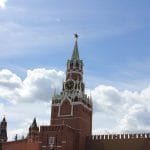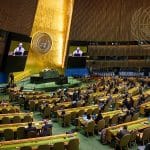President Nicolas Maduro of Venezuela was sworn in on January 10 for his third six-year term. Promising that his third term would be one of “peace, prosperity, equality, and new democracy,” Maduro faced rallies in the streets of Caracas and poor inauguration attendance from his hemispheric allies with no-shows at the event from the leaders of key neighboring states Brazil and Colombia (Cuba and Nicaragua’s presidents were present).
The probable opposition winner of last year’s July 28 elections, now made essentially indisputable by tally sheets showing challenger Edmundo Gonzalez pulled in as many as double Maduro’s total, did not return to Caracas to challenge the swearing in (he left for Madrid on September 7 last year after hiding out in several western embassies in the weeks after the disputed election). Another key opposition figure, María Corina Machado, who has remained in Venezuela but mostly in hiding, was briefly detained the day before the inauguration but later released and allowed to participate in anti-Maduro demonstrations.

Washington has referred to Gonzalez as “President-elect” since late last year. He has met with senior U.S. officials, including President Joe Biden, and Secretary of State Antony Blinken has stated that González “remains the best hope for democracy” in Venezuela.
Sanctions, the military, and relief measures for refugees
Responding to Maduro’s inauguration, Washington imposed sanctions on eight additional Venezuelan officials and increased the reward for Maduro’s arrest from $15 million to $25 million. Maduro’s official presidential plane was seized back in September 2024 while out of the country for routine service.
Rewards also exist for information leading to the arrest or conviction of Interior Minister Diosdado Cabello and Defense Minister Vladimir Padrino López. The European Union and United Kingdom also announced new sanctions on Caracas on January 10.
The White House has not announced whether it would clamp down on existing export licenses that allow Venezuela’s state oil company PDVSA to market oil and gas in collaboration with the U.S. and other foreign companies.
Analysts point to the fact that Venezuela’s senior military leadership, some of whom are now facing sanctions, continue to support Maduro’s claims of a legitimate electoral victory.
Human rights experts argue that it is critical for the opposition to build bridges with the military, and to offer them appropriate incentives to support a transitional government. One International Crisis Group expert, Phil Gunson, was quoted by U.S. broadcaster NPR as saying, “the people in the military have been compromised in human rights abuses, and they aren’t likely to ditch Maduro, unless it’s clear that there’s a path out of this situation which allows them to stay out of jail and maintain at least a part of the wealth that they’ve accumulated.” As the world recently witnessed in Syria, support of the military remains crucial when political legitimacy is otherwise questionable.
In another not-unexpected move, President Biden on January 10 extended temporary protected status for approximately 600,000 Venezuelan nationals in the United States for an additional 18 months, citing “the severe humanitarian emergency the country continues to face due to political and economic crises under the inhumane Maduro regime.”
Higher priority under Trump?
U.S.-based Venezuelan exile groups generally supported former President Donald Trump’s re-election campaign and have tightly allied with anti-communist Cuban exile groups in Florida to provide Trump’s campaign steady and effective electoral support there. Since incoming Secretary of State Marco Rubio has roots in the Florida Cuban community, the Venezuelan political situation and the question of sanctioning Venezuela’s oil exports is expected to become a Trump administration foreign policy priority, along with a number of other western hemisphere issues.








